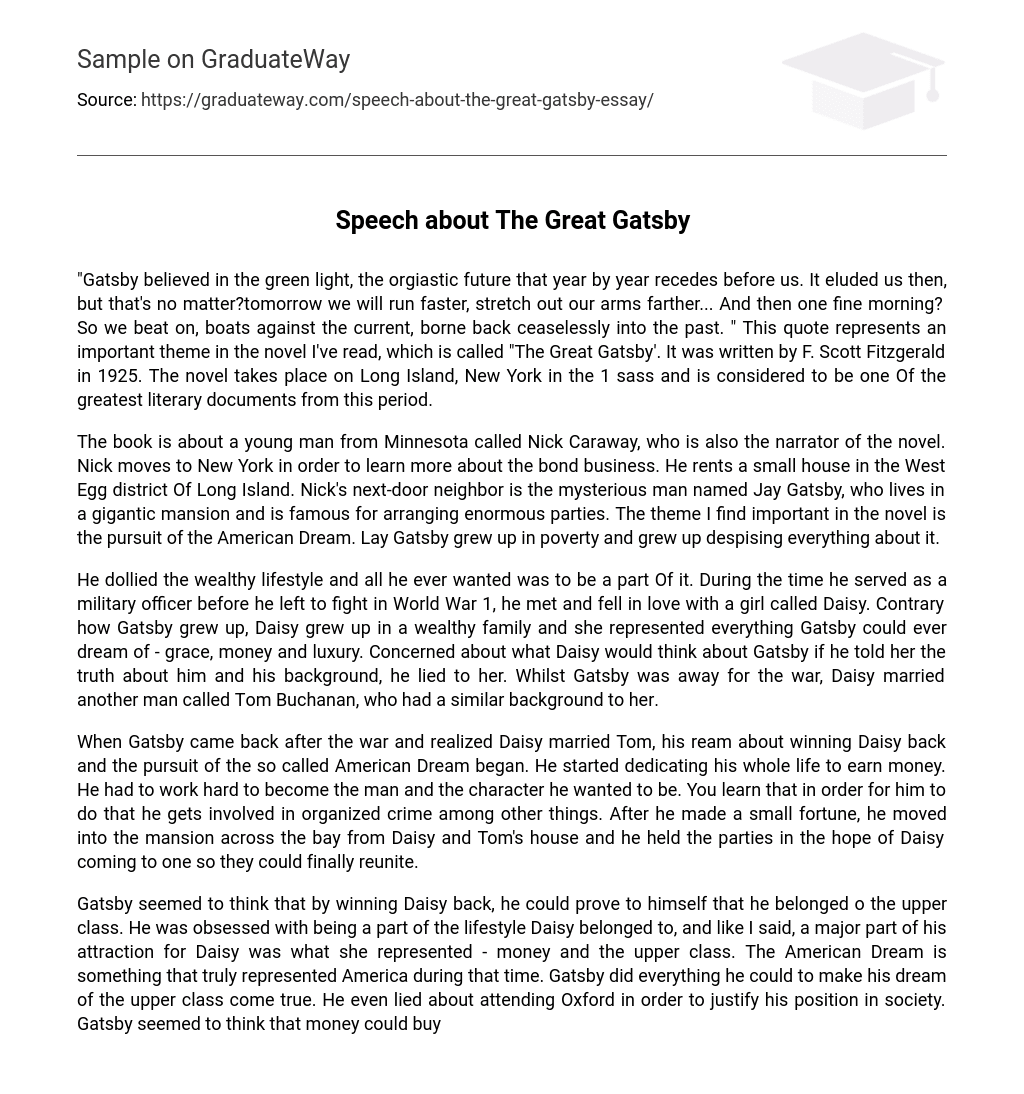“Gatsby believed in the green light, the orgiastic future that year by year recedes before us. It eluded us then, but that’s no matter?tomorrow we will run faster, stretch out our arms farther… And then one fine morning? So we beat on, boats against the current, borne back ceaselessly into the past. ” This quote represents an important theme in the novel I’ve read, which is called “The Great Gatsby’. It was written by F. Scott Fitzgerald in 1925. The novel takes place on Long Island, New York in the 1 sass and is considered to be one Of the greatest literary documents from this period.
The book is about a young man from Minnesota called Nick Caraway, who is also the narrator of the novel. Nick moves to New York in order to learn more about the bond business. He rents a small house in the West Egg district Of Long Island. Nick’s next-door neighbor is the mysterious man named Jay Gatsby, who lives in a gigantic mansion and is famous for arranging enormous parties. The theme I find important in the novel is the pursuit of the American Dream. Lay Gatsby grew up in poverty and grew up despising everything about it.
He dollied the wealthy lifestyle and all he ever wanted was to be a part Of it. During the time he served as a military officer before he left to fight in World War 1, he met and fell in love with a girl called Daisy. Contrary how Gatsby grew up, Daisy grew up in a wealthy family and she represented everything Gatsby could ever dream of – grace, money and luxury. Concerned about what Daisy would think about Gatsby if he told her the truth about him and his background, he lied to her. Whilst Gatsby was away for the war, Daisy married another man called Tom Buchanan, who had a similar background to her.
When Gatsby came back after the war and realized Daisy married Tom, his ream about winning Daisy back and the pursuit of the so called American Dream began. He started dedicating his whole life to earn money. He had to work hard to become the man and the character he wanted to be. You learn that in order for him to do that he gets involved in organized crime among other things. After he made a small fortune, he moved into the mansion across the bay from Daisy and Tom’s house and he held the parties in the hope of Daisy coming to one so they could finally reunite.
Gatsby seemed to think that by winning Daisy back, he could prove to himself that he belonged o the upper class. He was obsessed with being a part of the lifestyle Daisy belonged to, and like I said, a major part of his attraction for Daisy was what she represented – money and the upper class. The American Dream is something that truly represented America during that time. Gatsby did everything he could to make his dream of the upper class come true. He even lied about attending Oxford in order to justify his position in society. Gatsby seemed to think that money could buy him happiness.
And although Gatsby was incredibly rich, he found that none of the things his none could buy him brought him any happiness. Fitzgerald grew up in Minnesota. In 1917, he was sent to fight in World War 1 and is therefore considered to be a part of the so called “lost generation”. The generation that fought in the war started living an extravagant lifestyle to compensate for the tragic events taken place during the war, just like Gatsby. He also met his wife Zelda, during the war, who he asked to marry him. But since Zelda wanted wealth and leisure, the wedding got delayed until Fitzgerald could prove a success.
As you might be TABLE to hear, this is basically hat happens in The Great Gatsby and you can see parts Fitzgerald personality and background in both Gatsby and Nick. After the war and after they got married and had children, they moved to Long Island. Fitzgerald got most of his inspiration for the novel from the time they lived on Long Island. Their neighbors were an extremely wealthy couple who also became a source of inspiration. He called the Great Gatsby “a novel of selected incidents”. The language throughout the novel is full of images and Fitzgerald also used a lot of metaphors.





